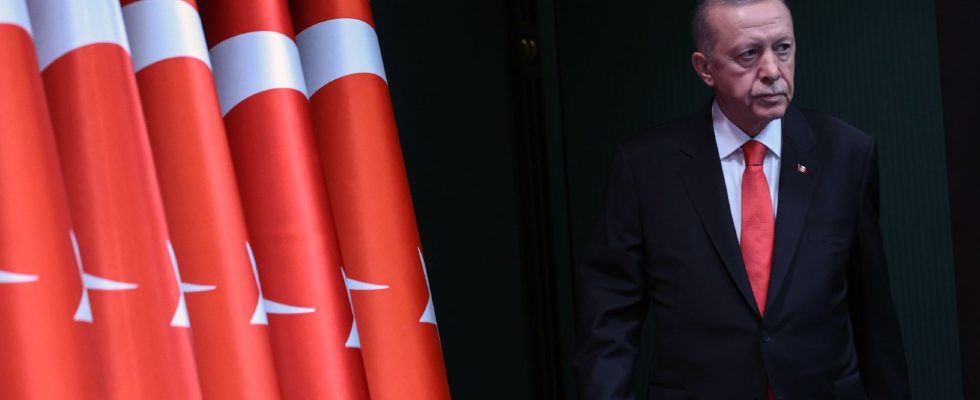For the 100th anniversary of the founding of the Turkish Republic – officially on October 29 – Recep Tayyip Erdogan had promised grandiose celebrations to his country. Preparations even began three years ago, with a presidential decree. But the big celebration, supposed to mark the entry into the “century of Turkey” (as the government’s propaganda announces), is pale in comparison these days.
Only a lucky few in Istanbul will be able to witness a drone and fireworks show on the Bosphorus, with no official receptions or ceremonies scheduled at Ankara’s presidential palace. The few public concerts or shows planned in certain schools, as well as the programs of the national channel TRT, have been postponed sine die by the authorities, citing the ongoing tragedy in the Gaza Strip. A very practical excuse for the government, which favors pro-Palestinian demonstrations over those in favor of Atatürk, after the Turkish president described Hamas members as “liberators” this week.
Between Erdogan and Atatürk, a rivalry for History
This muting of the centenary celebrations, much criticized by the opposition, illustrates Erdogan’s strategy of avoidance in the face of the very symbolic and cumbersome historical figure of the founder Mustafa Kemal, known as Atatürk (“Father of the Turks”). In Istanbul, the rare celebratory initiatives clearly illustrate the choice to be made between these two figures of modern Turkey. In the very secular and Kemalist district of Nisantasi, in the center of Istanbul, the town hall displayed large banners bearing the image of Atatürk for the occasion. But on the Asian side of the city, in the conservative district of Usküdar, a special exhibition celebrating the achievements of Erdogan’s last twenty years in power welcomes visitors.
“Like Mustafa Kemal in his time, Erdogan is trying to proclaim the advent of a ‘new Turkey’ and make a clean sweep of the past,” explains historian Dogan Çetinkaya. But the figure of the hero of the Battle of the Dardanelles and the War of Independence, around whom a veritable cult of personality was built, remains a model for a large part of the Turkish population. His abolition of the caliphate, which he replaced with a very Jacobin and authoritarian system, and above all his combative secularism aimed at very strictly regulating the Muslim religion, or even excluding it from the public space, have, however, earned him for a century hatred of the most pious and conservative Turks.
In more than twenty years in power, the AKP party, although it comes from political Islam, has not debunked the figure of Atatürk. In 2013, Erdogan, then Prime Minister, blurted out a phrase mentioning “two drunkards” to indirectly designate Mustafa Kemal (died of cirrhosis) and his successor Ismet Inönü, sparking a storm of indignant protests. He hasn’t risked it since. During the reconversion of Hagia Sophia into a mosque, in 2020, its powerful minister of religion, Ali Erbas – president of the directorate of religious affairs for 130,000 imams and civil servants – risked “cursing” from the pulpit “the one who had made this building a museum” in 1934, without daring to mention the name of Mustafa Kemal.
In recent years, anonymous attacks have increased against busts or statues of Atatürk throughout Turkey. But beware of offenders who do not operate under the cover of night. Last October, a 17-year-old student from a religious high school took down from the classroom wall an image of Atatürk, one of those that adorns every official building and even most shops in the country, before rubbing it crotch mockingly in front of his comrades’ phone cameras. Immediately arrested, detained for three days, he was finally released but remains for the moment sentenced to one year in prison.
The authorities sometimes even feel forced, by nationalist overbidding, to become the defender of this hated figure. Thus last August, the Disney + video platform announced, following a campaign by Armenian associations, the deprogramming of a series produced on Atatürk, finally converted into a film broadcast at the end of the month on televisions and in Turkish cinemas. “It’s a shame,” Ömer Çelik, the main leader of the AKP, felt obliged to react.
Despite their head-on opposition on religion, many parallels exist between Erdogan and Atatürk: their fierce nationalism and hostile to minorities, or their desire to create a party-state which governs society. “Like Mustafa Kemal in his time, Erdogan gives his name to places and public works during his lifetime, but he does not enjoy the same power and the same margin of action to modify society,” judges historian Dogan Cetinkaya.
.
